Product Information
BoneKare® is a bone health and soft tissue vitamin supplement for horses of every age.
EXCEL WITH BONEKARE®, CONTAINING THE REVOLUTIONARY VITAMIN KQ® FORMULA
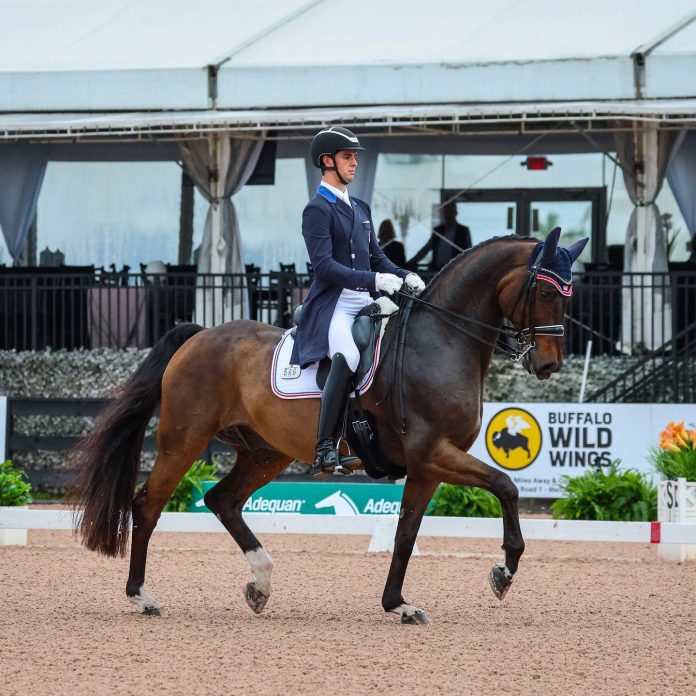
UNLOCK THE FULL POTENTIAL OF YOUR HORSE’S HEALTH WITH BONEKARE®
Understanding your horse’s health is essential, and one critical yet often overlooked factor is the impact of Vitamin K1 deficiency—This deficiency can affect your horse’s overall health and is a common issue for horses living in stalls or without access to quality turnout pastures.
Vitamin K1, obtained through natural dietary sources like fresh green grass, plays a vital role in activating Osteocalcin, a protein that binds calcium in bones. Osteocalcin enhances bone formation and strength and is critical to soft tissue health and healing.
However, the natural form of Vitamin K1 poses challenges. It is highly unstable, degrading under sunlight and losing potency just hours after pasture is cut for hay. As a result, horses on typical stall diets may struggle to get adequate amounts of this essential vitamin through diet alone.
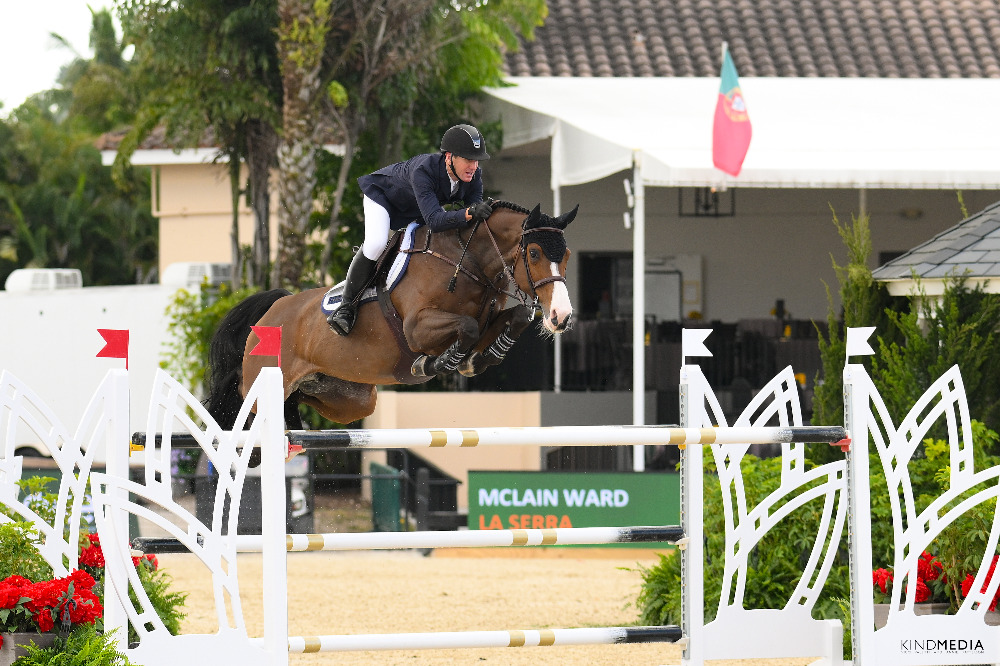
WHY BONEKARE®?
Horses removed from Vitamin K1-rich green pasture and brought into a stall regime have demonstrated a reduction in bone density within just 7-10 days! They should be given BoneKare.
Vitamin K1 is naturally available in fresh-growing green pasture, but it is highly unstable, being degraded by UV light, and loses most of its potency within hours after being cut for hay. Using BoneKare® every day promotes optimal bone and soft tissue health for your horse.
Low K1 may result in:
- Bruising within the foot
- Bone bruising
- Arthritic changes
- Osteochondrosis (OCD) bone and cartilage problems in Yearlings
- Developmental Orthopedic Issues (DOD) in Yearlings
- Dorsal Metacarpal problems (DMD)/Bucked Shins in 2-year-olds
- Slow healing

VITAMIN K1: THE CORNERSTONE OF BONE HEALTH
Vitamin K1 deficiencies can significantly impact your horse’s overall health and soundness. Recognizing this challenge, we’ve reimagined traditional Vitamin K1 to create a solution that is not only more stable but also dramatically more absorbable. By adding Vitamin KQ® to their routine, you’re providing advanced nutritional support for bone health, soft tissue health and overall vitality.
BONEKARE® stands out as the only product of its kind featuring Vitamin KQ®, a stable, patented, and water-soluble form of Vitamin K1. This innovative formulation offers 10x higher bioavailability compared to fat-soluble Vitamin K1, which is less efficiently absorbed by the body.
Including BONEKARE® in your horse’s daily feed is an easy way to help support their bone health and overall well-being.

A PROACTIVE APPROACH TO EQUINE WELLNESS
BONEKARE® complements a balanced diet, making it a great choice for performance horses, those in recovery, or those simply enjoying life.
BONEKARE® is recommended by veterinarians and trusted by horse owners across Europe and North America.
Backed by extensive research and a loyal customer base, BONEKARE® is a reliable choice for those seeking a high-quality, scientifically advanced supplement to support bone health, soft tissue health, and overall vitality.
Make the choice to give your horses the care they deserve with BONEKARE®.

BoneKare® is a bone health and soft tissue vitamin supplement for horses of every age.
BoneKare® is an edible daily vitamin supplement for all horses, but especially those:
- Horses whose daily diet lacks fresh, quality green pastures
- Horses with neck, shoulder and back issues
- Horses with pre-existing or at-risk of bone disorders and injuries
- Broodmares in foal
- Post-surgical and healing horses
- Developing and aging equines
- Have competition lifestyles
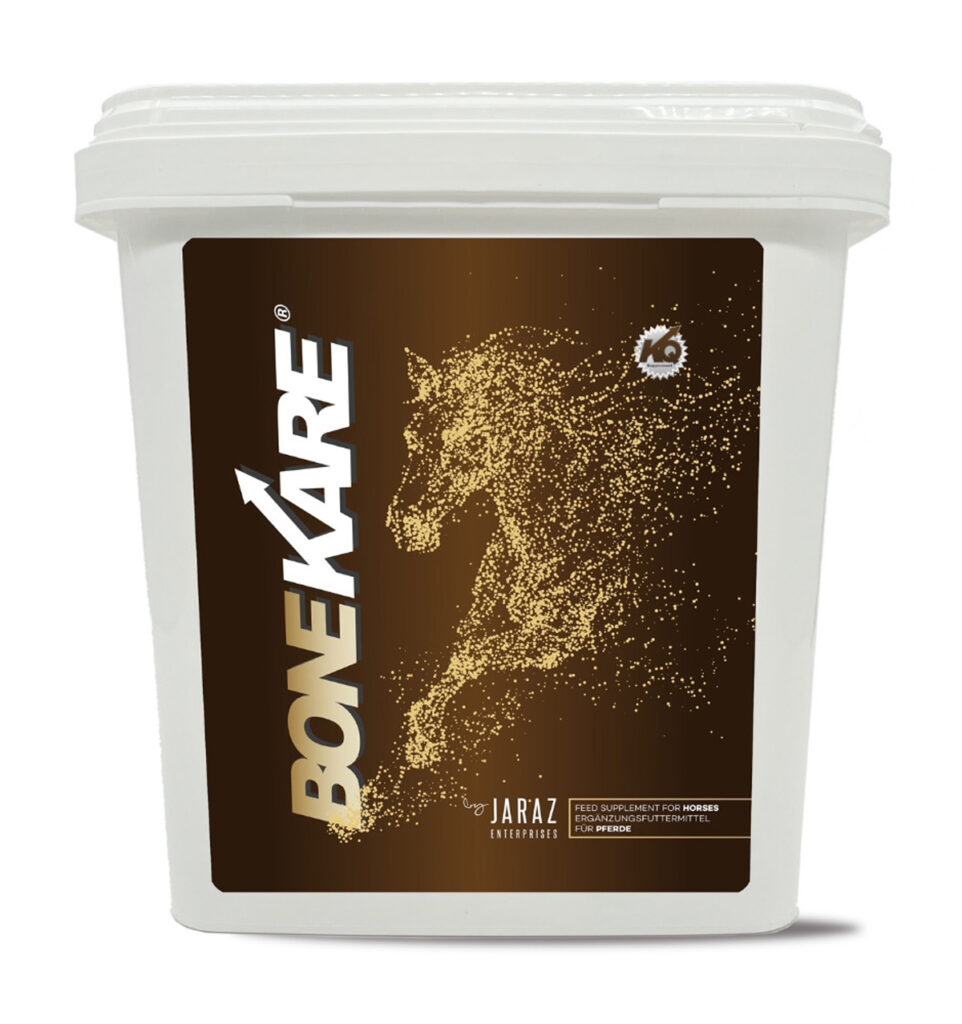
BONEKARE® With KQ®
The active ingredient in BoneKare® is Vitamin KQ®, a patented, UV-stable, water-soluble, highly bioavailable form of vitamin K1.
Vitamin KQ® works with the horse’s own natural production of Vitamin K2, supporting the body’s absorptive capacities, ensuring the vitamin is used as safely and effectively as possible.
Formulated with the optimal amounts of Vitamin KQ®, Vitamin D3 and Calcium, BoneKare® works in synergy and is the complete package for optimal bone and soft tissue health.
3kg | $199
Reviews + Studies
BoneKare® is prescribed by veterinarians at more than 1,500 equine clinics in Germany, the United Kingdom, and throughout Europe. Now available in the United States, without a prescription, and is the most researched and superior bone support and bone-building product in the world.
The main patented ingredient, KQ®, made a huge difference in all my horses.
Jay Golding, President & Founder, Bonekare® USA
Comments From BoneKare® Clients
We’ve seen really sustained, amazing performance from him since using BoneKare. It’s been really helpful at keeping him performing at high competition levels. With dressage, the horse experiences a lot of skeletal pressure as they articulate themselves. By using BoneKare, I’ve seen them feel stronger in those movements and push through them more powerfully as well.
Bonekare is the product that I use for the extra bit of soundness that my horses need for top competition . As a skeptic, I have been most impressed by the way that it has made my horses feel.
I have been using Bonekare for the last several years. It has helped my young horses that have had injuries. It has kept my competition horses healthy and at their best.
When using BoneKare®, I see a distinct difference in my horses’ soundness. It specifically alleviates swelling in joints and I notice an improvement in length of stride and quality of jump. I believe BoneKare® to be an integral part of my training program.
Maintaining peak performance in my horses is paramount, and Bonekare has proven to be an invaluable addition to our regimen. The unique formulation and its positive impact on bone health have not only impressed me but have also made a noticeable difference in my horses’ overall well-being. As we navigate the competitive world of show jumping, having confidence in their health is non-negotiable. Bonekare has become an essential part of our journey towards success in the arena, ensuring my equine partners are at their absolute best.
Independent Veterinary Studies
These studies are presented for informational purposes only and are not intended as an endorsement of any product. The information is not intended to be a substitute for visits to your veterinarian. Rather, the case studies offer the reader information written by veterinarians and/or horse owners concerning animal health and products that have shown results.
VITAMIN K ABSORPTION IN THE HORSE
FOAL AGE 2 ½ MONTHS
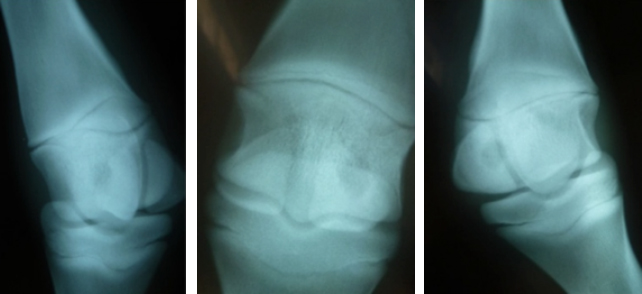
FOAL AGE 4 ½ MONTHS

DR BERNHARD JANETZKO
3 MONTHS WITH SUPPLEMENT
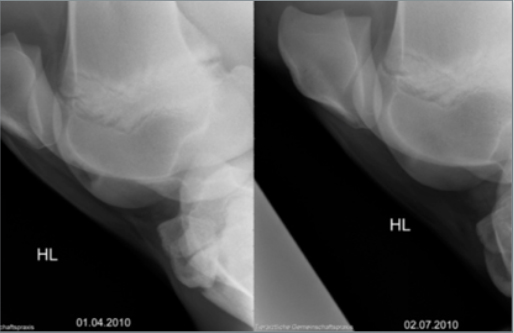
04/01 – 07/02
DR CHRISTOPH ROWOLD
#1 – 3 ½ MONTHS WITH SUPPLEMENT
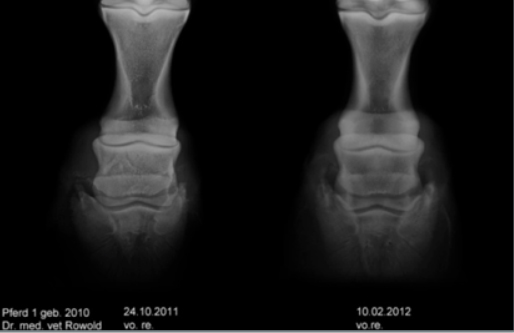
10/24 – 02/10
DR CHRISTOPH ROWOLD
#2 – 3 ½ MONTHS WITH SUPPLEMENT
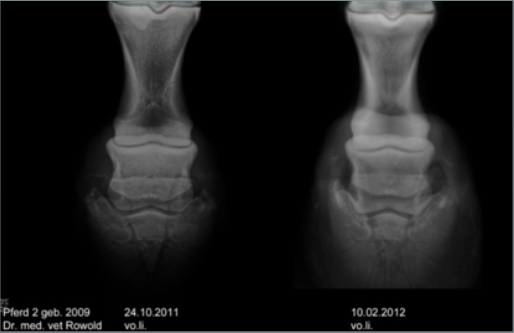
10/24 – 02/10
DR CHRISTOPH ROWOLD
#3 – 3 ½ MONTHS WITH SUPPLEMENT
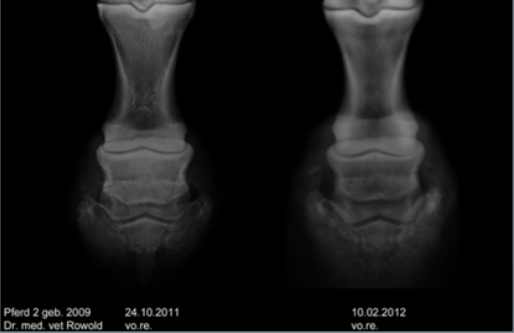
10/24 – 02/10
DR CHRISTOPH ROWOLD
#4 – 3 MONTHS WITH SUPPLEMENT

11/16 – 02/14
- Treatment of pre-sale thoroughbred yearlings with severe OCD lesions
- 8 yearlings in Australia with severe OCD lesions were supplements with 14mg Vitamin K1 (QAQ) per day for 3-7 months before re-examination
The following are a selection of these cases, including timestamps
OCD CASE 1 – 2.5 MONTHS WITH SUPPLEMENT

OCD CASE 2 – 3 MONTHS WITH SUPPLEMENT

OCD CASE 3 – 4 MONTHS WITH SUPPLEMENT
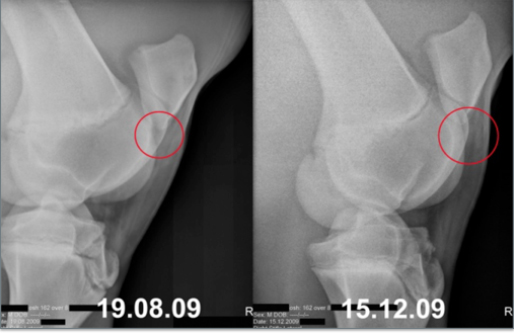
OCD CASE 4 – 4 MONTHS WITH SUPPLEMENT
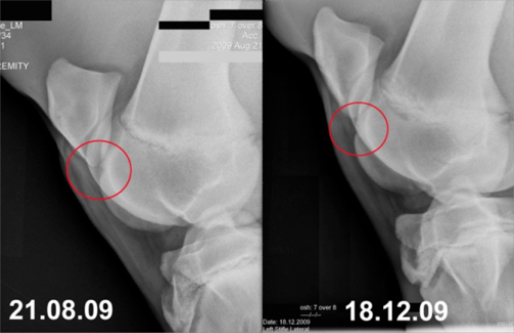
OCD CASE 5 – 4 MONTHS WITH SUPPLEMENT
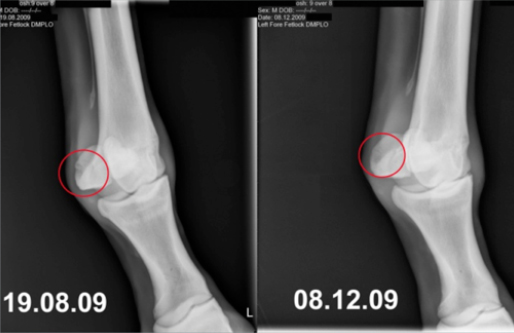
OCD CASE 6 – 6.5 MONTHS WITH SUPPLEMENT

OCD lesion score of 8 thoroughbred yearlings before and after supplementation
|
|||||||||||||||||||||||||||
|
|
|||||||||||||||||||||||||||
- This is an eleven-year-old Warmblood gelding that was admitted to our hospital on 6/25/15 with an acute 3+/5 grade lameness of the right hind limb.
- Radiographs confirmed an articular medial wing fracture of the right hind coffin bone (image to left).
- Follow up examination and radiographs were taken on 8/05/15. Lameness was no longer present and there was a remarkable evidence of healing at the fracture site (image to right).
NOTE: Coffin bone fractures are known to heal by fibrous union leaving a wide radiolucent fracture line that is evidence of an incomplete healing. There is a narrowing of the fracture line after 60 days, with continued treatment, complete healing will occur.

Credit: Daniel V. Flynn, VMD – Equine Veterinarian
WEANLING 5 ½ MONTHS WITH SUPPLEMENT
This weanling was started on BoneKare® after the identification of a stifle OCD lesion. Follow up RADS demonstrated remarkable healing of the OCD lesion after 5.5 months. Clinical impressions suggest that BoneKare® has real effect on bone remodeling and development.
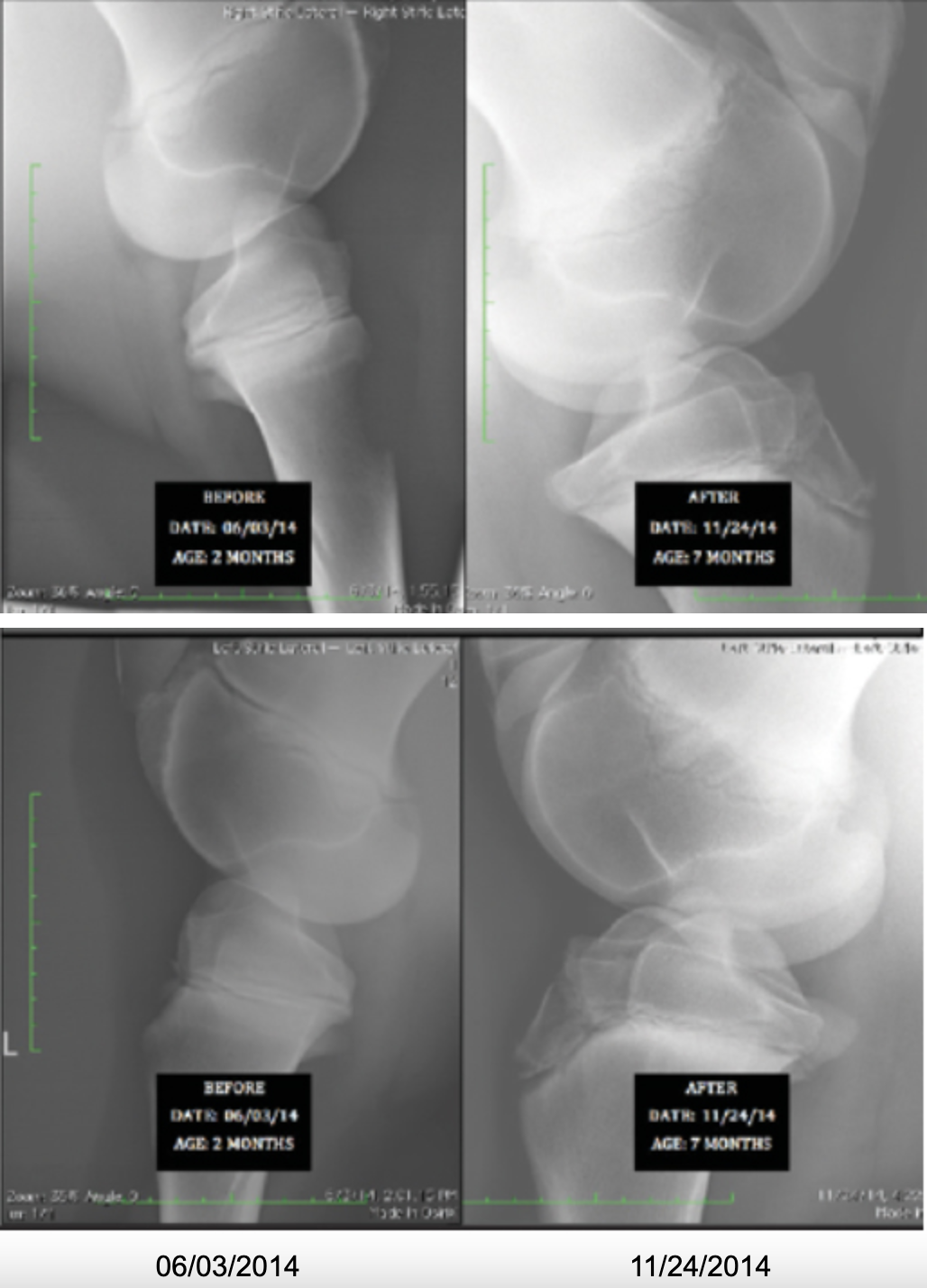
June, 03 – November, 24
Credit: Timothy R. Ober, DVM, MRCVS
- Bone density development was assessed using RBAE in 26 2-year-old thoroughbred racehorses in the same stable
- The treatment group received 7mg/water soluble VK1 (QAQ) per day, while the control group received a placebo blank powder
- The trial was carried out over 8 months
There was a greater increase of bone density in the treatment group compared to the control group
Trial 1 shows marked increases in bone density in two-year-old racehorses who were treated with Quinaquanone®
Twenty-six, two-year-old thoroughbred racehorses, at the beginning of race training, were divided into two groups.
One group (Quinaquanone®) received 7mg formulation each day in their feed for eight months. The other group (“Control”) received an apparently identical powder containing no Vitamin K1.
Digital radiographs of the left third metacarpal bone and an adjacent aluminum step wedge were taken at various intervals. The radiographic density of the bone and the step wedge were measured and RBAE (radiographic bone aluminum equivalence) calculated. At each subsequent measurement the RBAE for each horse was compared to its initial RBAE and the percentage change recorded.
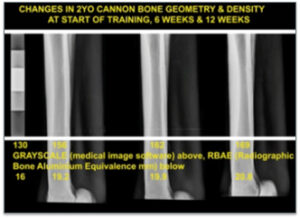

| Date | 09/12/2008 | 10/14/2008 | 12/31/2008 | 02/02/2009 | 05/08/2009 |
| Vitamin K | 0 | 1.04±0.31 | 4.54±0.75 | 7.68±1.67 | 9.05±0.91 |
| Control | 0 | 0.35±0.71 | 2.82±2.97 | 3.97±2.83 | 5.02±2.17 |
Bone Density Trail in Two Year Old Racehorses
Mean percentage change in RBAE over time
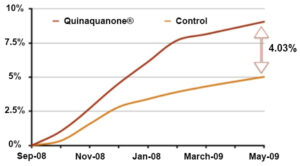
Percentage change of radiographically measured bone density of 26 racehorses over eight months
These coffin bone radiographs are of a 13-year-old Dutch Warmblood taken at 2 months, 4 months and 6 months—with a total of four months healing with supplementation using Quinaquanone®.
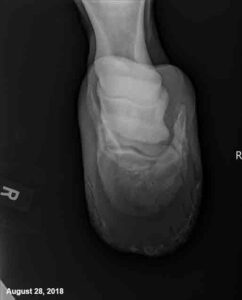
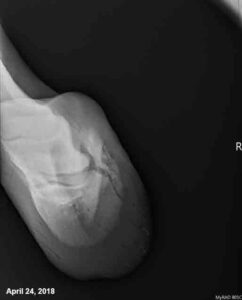
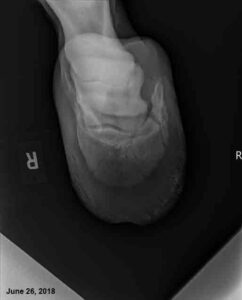
T.J. Fischer, A.J/ Cawdell-Smoth. A.M. Talbot H.L. Regtop, J.R. Biffin, and W.L. Bryden University of Queensland, Equine Research Unit, School of Agriculture and Food Sciences, A Agricure PTY Ltd., Bracmar NSW, 2576, Australia
The role of vitamin K in blood coagulation has been known for many decades, but in recent years it has shown to be a factor in many other physiological processes. Studies in human and rodents have heightened the role of vitamin K, and its dependent proteins, in bone metabolism, energy utilization and immunity. Placental transfer of vitamin K is limited in the human, and there has been no research conducted on horses on this aspect of vitamin K metabolism or transfer of the vitamin into milk. The objective of this study was to determine if vitamin K crosses the equine placenta, and if the concentration of the vitamin in mare’s milk can be modulated by dietary supplementation.
Eighteen late gestation mares were allocated to three treatment groups. These treatments consistent for a control (no vitamin K administration), Vitamin K3 (menadione) and vitamin KQ (Quinaquone™ a soluble form of K1 and K2 (10:1)). The vitamin treatments were administered as a 4mg oral bolus paste to each horse, 3 times per week (Monday, Wednesday and Friday), until parturition.
Administration of the paste commenced 28 days before the due foaling date. Blood sampling of the mares was undertaken weekly up to foaling, at parturition and 7 days later. Blood sampling of the foals and milk collection from the mares were performed simultaneously prior to first suckle by the mare, 12hrs, 34hrs and 7 days post birth. Plasma samples for each treatment along with the milk samples were analyzed by HPLC for vitamin K concentrations.
No differences in circulating concentrations of vitamin K were found in mares irrespective of supplementation group. However, milk concentrations at parturition reflected supplementation with KQ mares having a significantly (p<0.05) higher value than the other two groups. Values for both supplemented groups returned to control levels within 7 days of cessation of supplementation. The failure to detect differences in circulating levels in mares prior to foaling may reflect the time of sample collection as previous studies found that the half-life of vitamin K is rapid. Plasma K2
Order BoneKare
BoneKare® is prescribed by veterinarians at more than 1,500 equine clinics in Germany, the United Kingdom, and throughout Europe and now is available in the United States, without a prescription, and is the most researched and superior bone support and bone-building product in the world.

